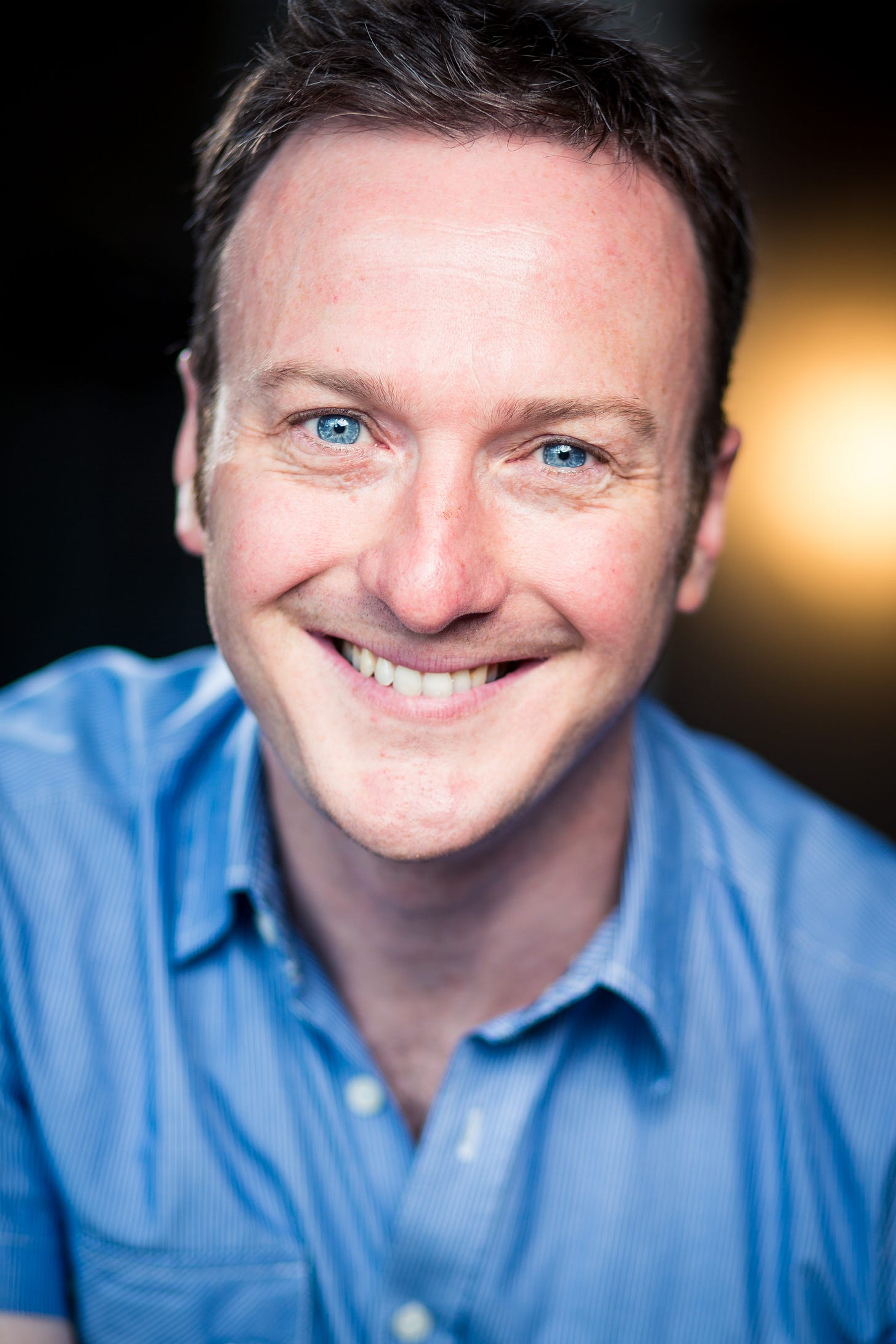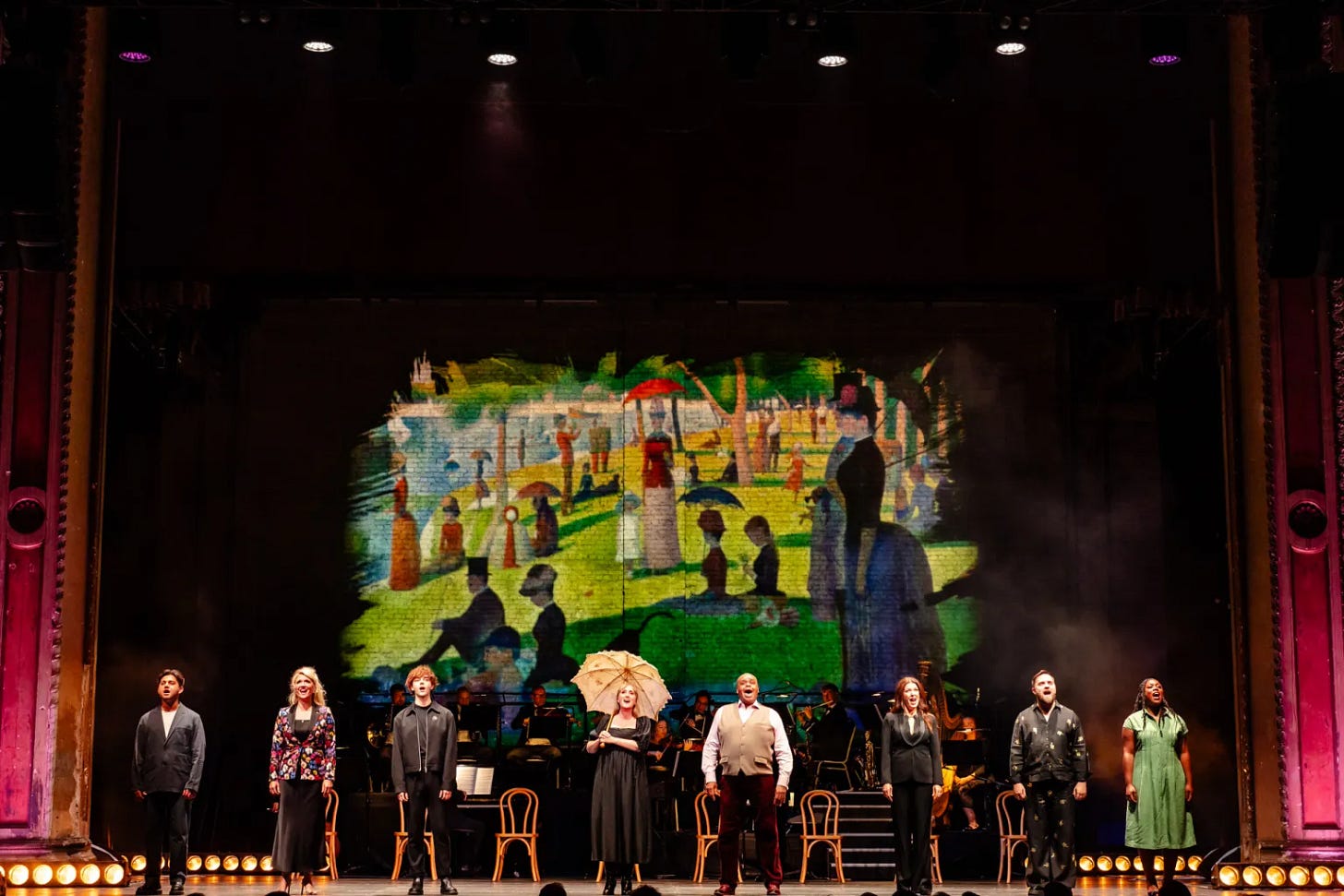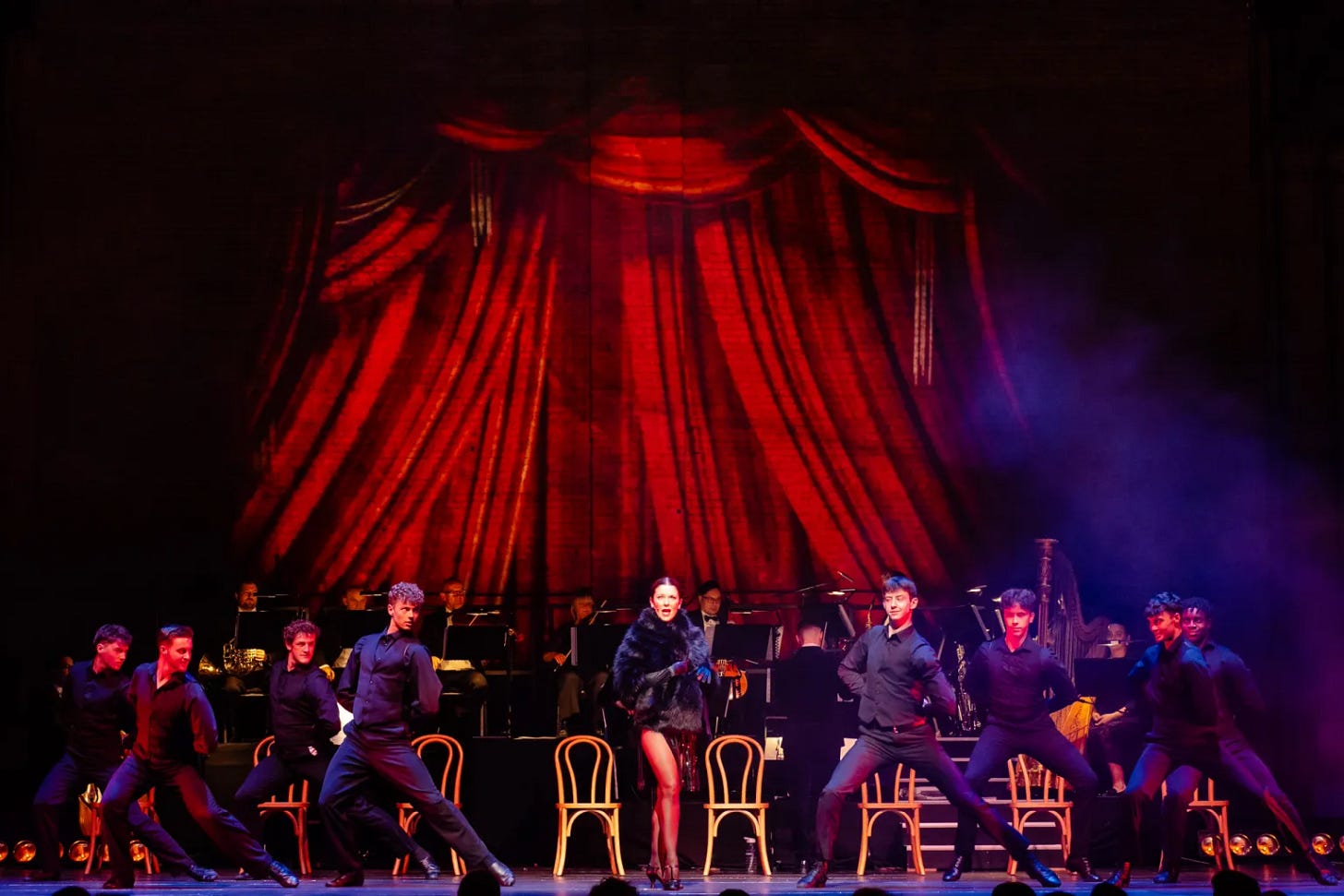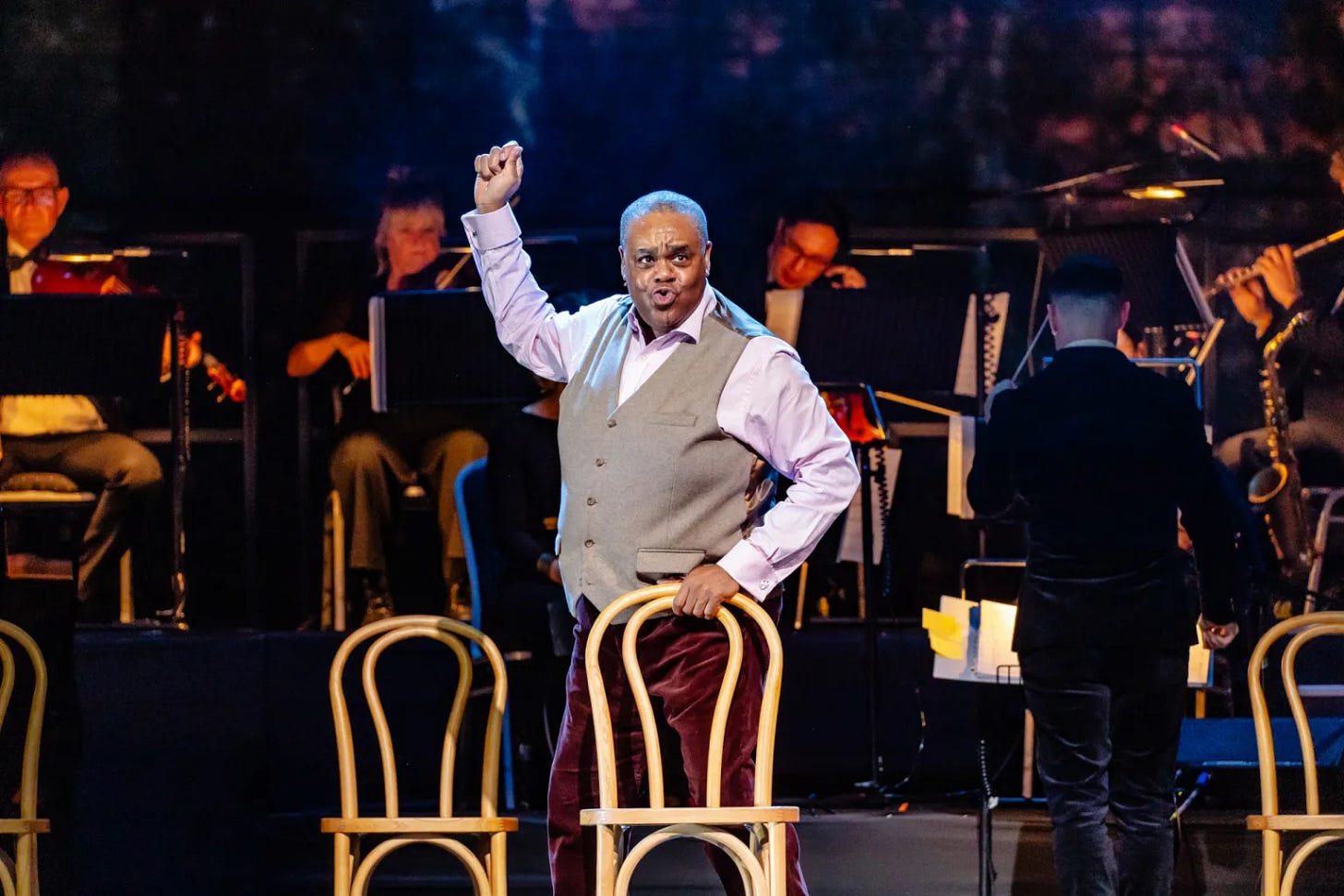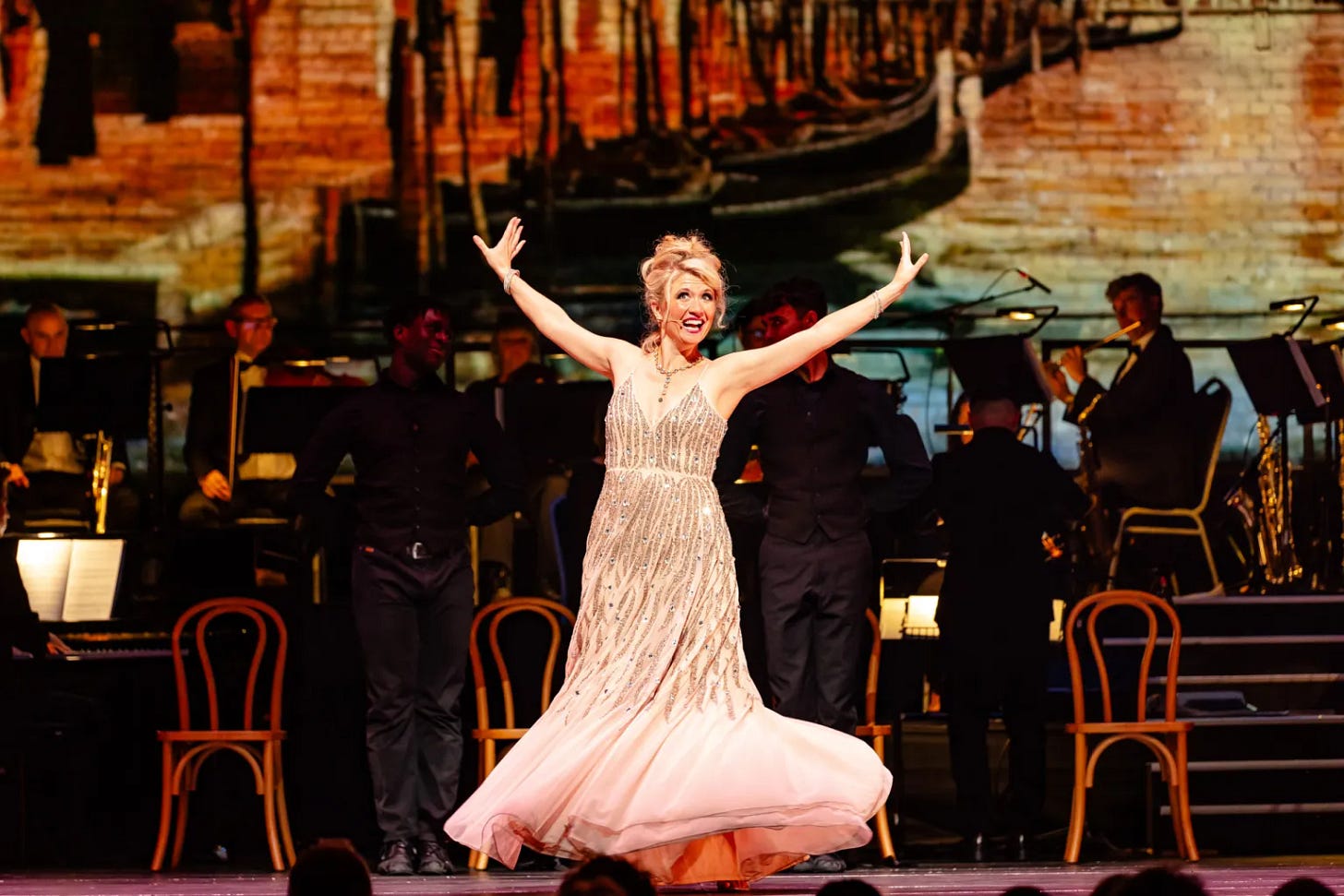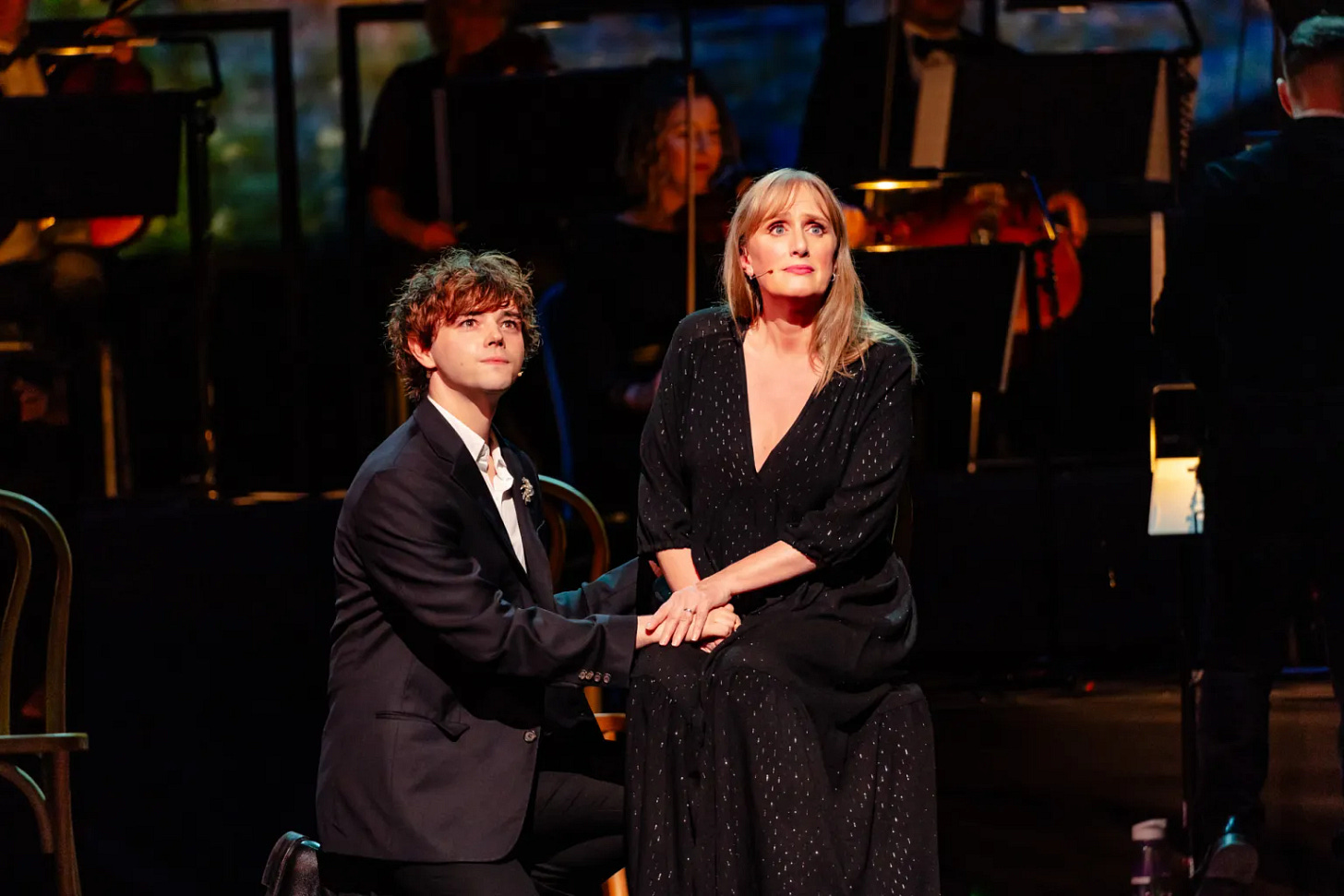I’m so pleased to introduce this conversation with director Paul Foster, one of the UK’s most thoughtful interpreters of Sondheim’s work. Paul directed the recent Sondheim on Sondheim at London’s Alexandra Palace, and has a wealth of Sondheim-related experience stretching much further back too. Paul’s perspective is fascinating, and it was a pleasure to meet him. Our conversation begins below:
Paul, it’s so good to meet you. I’d love to start with Sondheim on Sondheim, which I loved so much. How did you first become involved with it?
We’ve got to credit Alex Parker [musical director of Sondheim on Sondheim] for that in the first instance, because Alex is one of those people that tends to make things happen. I have tremendous admiration for him as an artist, but also as a galvanizer. We were doing White Christmas last year at Sheffield Crucible—preparing for it most of last year, and then going into rehearsal in autumn/winter. And he said, “Oh, I’ve got the rights to do Sondheim on Sondheim. I’d love you to do it.”
I had seen on YouTube Barbara Cook and Vanessa Williams do that arrangement of “Losing My Mind” and “Not a Day Goes By” that’s in the second half. Other than that, I didn’t really know much about it, to be absolutely honest. Ask me about Side by Side by Sondheim, and I could probably go on Mastermind or Eggheads about that, because I wore that double CD out when I was at university. That was the Sondheim revue I was really familiar with.
But I was listening to the cast recording of Sondheim on Sondheim, and then we got the script for it, and what I loved about it was that it’s a chance to hear so much different material and things that were cut. There’s a really clever thing they do in the second half where they talk about the genesis of “Being Alive,” and so you hear all these versions. Nowadays we save our files as version one, version two, and so on—and here, you get to hear “Multitudes of Amys,” then “Happily Ever After,” and then “Being Alive.” And I really like when Sondheim takes apart “Epiphany”—so you’re really getting into “Epiphany,” and then they cut to that South Bank Show interview from the early eighties, and Sondheim explains what his musical and psychological ideas are for that number. And then you cut back to the actor continuing the number.
I really liked that theatricality—and it wasn’t just for nerds. I thought it was a really interesting way of getting underneath the bonnet of a creative brain. That’s what appealed to me about it: the sense that Sondheim holds your hand throughout as you hear pieces all the way from juvenilia right through to Road Show. And sure, “Losing My Mind” and “Send in the Clowns” are in there, but there’s material in there too that’s more like taking B roads, or going down little rabbit warrens—and that’s what appealed to me so much.
Also, because it’s a cast of eight, they can each shine in so many ways. Take Josefina [Gabrielle], for instance: she was able to be Madam Rose on uppers, and she was able to do a really forensically detailed “I Read” [from Passion], and then she was able to be lifted up by the dancers in “Ah, But Underneath,” and then “Send in the Clowns.” So it becomes this wonderful kaleidoscope to view each performance through—and I could pick out any of our eight just like that.
How early did you and the team have these specific performers in mind? I’d imagine for this type of show in particular, casting has the potential to totally transform how you as a director are thinking about the piece.
I think it’s a mixture. What you want is not to have cookie cutters—so you want eight people to be really different in what they bring to the material, what their hinterland might be, and so that has a bearing on it. But for me, I wanted to feel that we could make sure that tonally they were very different. For instance, Jenna and Clive had that reworking of “You Could Drive a Person Crazy” as a duet, a marital spat on the sofa. And then later, Clive does “Epiphany” and Jenna breaks your heart with “In Buddy’s Eyes.” So you get them doing tonally so many different things. I think that’s really attractive for actors.
It made me long to see some of them in roles they should have already played. Clive would be a brilliant Sweeney, and I don’t know what Jenna can’t do. I’ve not found that role yet. To have her do Sally’s material from Follies was just gold dust, wasn’t it? And Sondheim gives such brilliant ingredients to actors in the way that he constructs his material. It’s all there. So sometimes as a director, you’re getting out of the way. That’s what you really want to do, rather than “Oh, I’m going to make it about this.” In a way, it’s a bit like brass rubbing: you’re just trying to bring up the imprint that’s underneath rather than cloud it with 57 conceptual ideas on top of it. He’s such a master at giving great material for actors.
Sometimes in musicals, the book scenes aren’t quite as good as the scores themselves. In those cases, as a director, as if you’re in a makeup chair, you’re trying to put concealer on underwritten bits or more two-dimensional bits. Whereas in Sondheim, he would always praise his collaborators. In fact, he does that in one of the videos in Sondheim on Sondheim. I’ve been lucky enough to direct both Hugh Wheeler book shows that he did—Sweeney Todd and A Little Night Music—and they are absolutely top-drawer masterpieces of dramatic construction. As a song goes to dialogue and back to song, everything is absolutely of a piece.
I think actors are sometimes used to having to make indifferent material shine, whereas with Sondheim, the material is so good that you’ve just got this brilliant set of ingredients to work with. Mrs. Lovett can be played in 67,000 different ways, because these are really titanic parts. I never tire of seeing his work, because there’s always so much room for maneuver in it.
And in Sondheim on Sondheim, because of the pre-recorded video interviews, there are some parts of the show that you have little or no control over. And coming to both shows, it was so thrilling to feel that visceral reaction to his words, even though they’re obviously not being spoken “live.” As a director, is that part of what you mean by brass rubbing in this case? Is it about doing just enough, but also giving those elements the right amount of breathing space?
Yes, I suppose it is about giving things their due space. I’m always trying to make sure that the lyric comes across absolutely crystal clear—especially when you think of so many of those songs, like “Now You Know” or “Franklin Shepherd, Inc.”, where things are going at a rate of knots, with all this rapidly delivered text. We have a really good sound designer in Paul Smith when we do those concerts with Alex, but the actors also know that the laugh is dependent on the clarity of the delivered lyric. So in terms of getting out of the way, you just want to make sure that the material is delivered uncluttered.
It does spark off associations. If I go back to A Little Night Music, for instance, I’ve sometimes seen productions where it’s been a little bit like posh people wittering, if I’m being really honest. I’ve certainly seen a couple where it all feels quite rarefied and quite starched. I grew up in a working class household in Lancashire. We certainly weren’t listening to Evening Primrose bootlegs when I was growing up—but I had a very close relationship with my maternal grandmother, and so my way into that show was the Fredrika and Madame Armfeldt relationship.
I didn’t have an absent parent like you could say Fredrika has, but that closeness between a grandchild and her grandmother really resonated. Yes, it’s about being indulged, but it’s also about somebody having your back, somebody always being supportive of you, somebody being patient with you, somebody encouraging you. That’s what that relationship is, so that was my way to talk about parents and children and grandparents and children.
So in Sondheim on Sondheim, that very scorching comment that he says about his mother, about the fact that when she went into the hospital to have open heart surgery, she made a point of writing to him that her only regret in her life was giving him birth… It’s the most scorching, horrendous thing to hear. And the construction of Sondheim on Sondheim means that the actress then has to come out and start “Children Will Listen.”
Now, in rehearsal, the brilliant Scarlett [Strallen], who fronted that number, was very moved. You know what you’re coming on after. But of course, if you’re then going to be sobbing in your voice and breaking, well, the audience don’t feel anything—because you already felt it all for them. So Scarlett had this incredible clarity, and it’s almost like she was an Elastoplast. What you have to do is put Humpty Dumpty back together again after you’ve had that kind of text—and so the song was allowed to be a healing thing. It’s a cautionary tale. It’s a roadmap for parenthood. But also, in the context of that show, with the line that we’ve just heard, it does a piece of work which is to try and offer salve.
You mentioned that you didn’t grow up listening to Sondheim bootlegs or anything like that. I’m fascinated, then: how did Sondheim first find his way into your consciousness? What was that relationship like, and how did it develop?
I wrote something the day after he died. I’m not normally moved to write things, but I wrote something then. The night that he passed away I happened to be watching Tick, tick... BOOM! Sondheim’s voice, as you know, is in that answer phone message at the end of the film. I hadn’t seen it before. I realized I must have been watching that around the time that he passed away. I remember putting on social media, “My God! Isn’t it incredible, this insight he has?” And then the next day I woke up and he had passed away.
In terms of how Sondheim came into my life, I got interested in theatre when I was about 13 or 14. I grew up in a small town in the Lancashire-Cheshire-Merseyside borders, halfway between Manchester and Liverpool, and I was lucky enough that our high school occasionally took us to the theatre. While I didn’t see a Sondheim musical, around the same time, BBC2 were broadcasting those PBS recordings of Sunday in the Park with George with Bernadette Peters and Mandy Patinkin, and the Joanna Gleason, Chip Zien Into the Woods.
And I’m often quite ambivalent about filmed theatre. It’s not quite the same as breathing the same air, is it? But I just responded to the storytelling and to the complexity and the simplicity of these two musicals. And like you wrote about in your essay on “Beautiful,” it’s that incredible marriage of something arrow-straight and simple, yet prismatically complex at the same time.
So, that’s where it started for me. Then, when I was 16, I was cast in our local amateur dramatic company production of Sweeney Todd. I played Tobias. I don’t even know if we scratched the surface of it, but I so clearly remember things like “Not While I’m Around” and that scene between him and Mrs. Lovett, where you slowly realize that she, who has got this affection for this child, knows that his life has to end if Sweeney’s secret is going to stay secret. And yet it’s a beautiful lullaby. You can watch Angela Lansbury singing it backed up by the Mormon Tabernacle Choir in Utah. That song can do a lot of different things.
I saw Sam Mendes’s production of Company when I was about 19 or 20, with Adrian Lester. I saw that twice. I just thought it was next level, really. It was extraordinary. He was only 27, I think, playing the famously 35-year-old Bobby. One of the times I saw it I was on the front row, and when he sang “Marry Me a Little,” the tears were pouring down his face. It was like looking into the clearest pond. He was incredible. They all were. Clive doing “Sorry-Grateful” too…
And for younger people, that equivalent experience might be Marianne’s brilliant production with Rosalie Craig. It’s whatever your gateway drug is at whatever time. And soon after Company, I saw the Merrily with Daniel Evans and Sam Spiro, Anna Francolini and Julian Ovenden—just phenomenal. We were very lucky in the UK with some incredible productions around that time.
It’s interesting that you mention Adrian Lester’s age there, because one of the things I loved about Sondheim on Sondheim is the way you catch glimpses of these characters in totally new ways, with actors who perhaps less precisely fit the “mould” that seems to have been established for some of these roles. For instance, seeing Jack Wolfe as George—
I knew you were going to say Jack Wolfe before you said Jack Wolfe!
Yes! It’s funny, isn't it? We have a certain image of George in our head, bearded and Mandy Patinkin-esque, which is obviously wonderful. But I found it so moving to see someone visibly younger singing to his mother, especially given that Seurat died at 31.
I couldn’t agree with you more. I found that profoundly moving in the rehearsal room. And bear in mind, we had six days of rehearsal. That’s all we had. Nobody took a piece of manuscript on. Nobody took a lyric sheet on. There were no music stands. We had six days, and they were extraordinary. And I agree: it’s like learning that Eva Perón died at 33. What’s so interesting about Jack playing George is the fragility of youth, the energy, and the idea that it’s quashable. I’ve seen countless people sing that song, and Jack showed me so many different avenues.
Some of those numbers are really hard if you’re going to go there—if it’s not going to be tits and teeth, and you’re really going to go there. And with “Beautiful,” what they mined in the time we had was extraordinary. And as you wrote about, it was a single chair and two actors, and this brilliant 14-piece orchestra. We didn’t have hydraulics. We didn’t truck anything else on. It wasn’t a big light show. It wasn’t Vegas. But the human truth that they found that was profoundly moving. We have some of the world’s greatest MT talents in this country, and Jack is one of the most special talents I’ve ever worked with.
Thinking back to when you were 19 or 20, going to see Company, did you have a specific sense of wanting to direct? Or was it more that you knew more generally that you wanted to be in the arts?
I trained as an actor. I acted at university, and I went to LAMDA, and I did a couple of bits of directing at university. I acted for about seven or eight years, and I did some decent things. Lots of unemployment as well. But I always thought that in this country, they don’t like you being lots of things. You have to choose the one thing. I was an okay actor. I was never going to set the world alight, but I wasn’t watching from behind my hands either.
I became a father at 30, and I was conscious that I was waiting for my agent’s number to show up on my phone with an incoming call, to see what the next step would be. And with a child, that felt like a very fragile place where I had no agency. I’m not saying as a director you have much more agency, but I wanted to roll those dice. And so I think it was the birth of my eldest daughter that made me rethink things.
I’ve been directing now for about 17 years, but I don’t regret having been an actor, because I think you can offer a different insight if you’ve been an actor. Quite a few directors were ex-actors, however long or short a time they were an actor, because you’re less likely to do some of the things that some directors do, which is to end-game and say, “Can you be sexy in this?” “Can you be funny in this moment?” “Can you be X, Y, Z?”—rather than think about what process might be useful to unlock an actor.
That’s a really interesting journey, because it marries the artistic and the practical—and it can seem as though we often don’t talk enough about the latter when it comes to career-related things. And you’ve arrived in a place that clearly brings you so much joy.
I’m never happier than when I’m in a rehearsal room. With Sondheim on Sondheim, there were no egos. It’s always good when everyone has as much good material as everyone else: no one’s looking left and right. Everyone’s got lollipops. Everyone’s got good material. So in that sense, it becomes a beautiful tapestry. I said to the cast, “Don’t feel you have to have the whole night on your shoulders. You are one brilliant eighth of the picture.”
It was a very, very happy room—and with such a brilliant choreographer in Jo Goodwin. We were able, in numbers like “Do I Hear a Waltz?” and “Comedy Tonight” and “Ah, But Underneath,” to make sure that there was a big, big visual aspect.
You’ve been so generous with your time. Just finally, I’d love to know what’s coming up next for you.
I’ve just done The Cabinet Minister at the Menier, which has gone really well and is selling out—and we hope there might be another life for that, although it’s a dice roll. Who knows? I’m doing a new piece of writing next year with Sarah Travis, who I’ve worked with a lot and who did the arrangements for A Little Night Music at The Watermill that I did.
There’s a particular Sondheim I’d love to do with one of our Sondheim on Sondheim cast members… so, let’s see if that happens. But I’m always looking for good writing, and I will let you know what else is coming up when they properly firm up into things. I always try to subscribe to that notion that I’m just trying to do good work, in good places, with good people.



